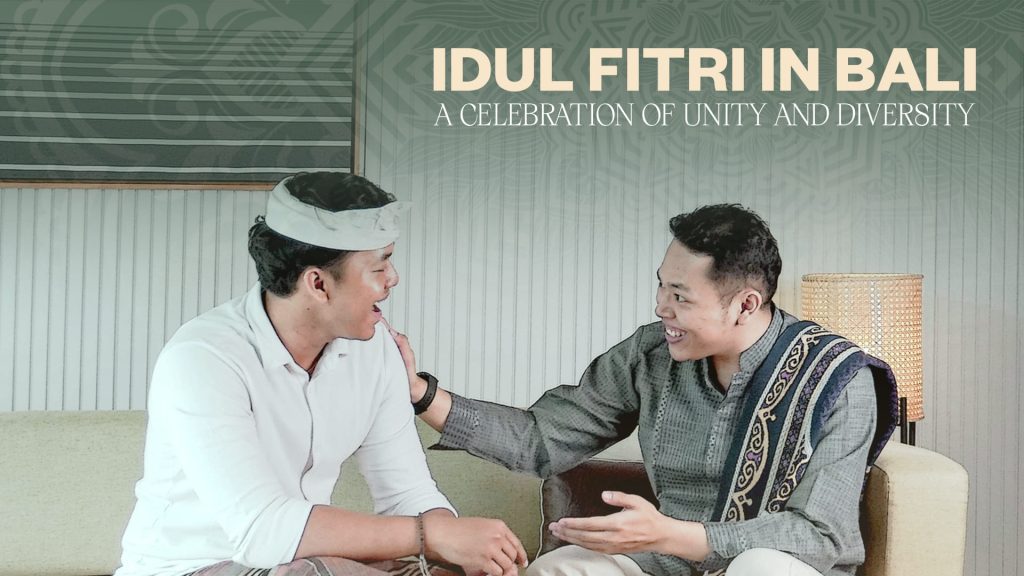Indonesia, the country with a majority Muslim population, is known for its rich cultural diversity. Despite Bali being predominantly Hindu, the island embraces the spirit of Idul Fitri (Eid al-Fitr) with warmth and solidarity, reflecting Indonesia’s harmonious coexistence of cultures and faiths.
Idul Fitri Traditions Across Indonesia
Idul Fitri marks the end of Ramadan, the holy month of fasting for Muslims. It is a time for spiritual reflection, gratitude, and joyous celebration. Across Indonesia, Idul Fitri is characterized by several traditions:
- Mudik (Homecoming): Millions of Indonesians travel back to their hometowns to celebrate with family. Usually days before the main Day of Idul Fitri.
- Eid Prayers: Communal prayers are held in mosques and open fields on the morning of Idul Fitri.
- Feasting and Sharing: Families prepare and share traditional dishes like ketupat (rice cakes), rendang, and opor ayam. Often, they also prepare a variety of cookies to serve to the guests.
- Silaturahmi: Visiting relatives and friends to ask for forgiveness and strengthen bonds.
Why This Year is Extra Special in Bali
This year, Idul Fitri in Bali is particularly unique because it falls just one day after Nyepi, the Balinese Day of Silence. Nyepi, one of Bali’s most sacred Hindu holidays, is a day of complete stillness and introspection. The entire island comes to a halt. No vehicles on the roads, no flights in or out, and even electricity use is minimized. It is a day for spiritual reflection and harmony with nature. The contrast of Nyepi and Idul Fitri showcases the incredible cultural and religious diversity of Bali. After a day of silence and contemplation, the island will come alive with joyous celebrations, marking the end of Ramadan. This rare overlap highlights Bali’s spirit of unity. While Nyepi and Idul Fitri are rooted in different faiths, they share common themes of self-reflection, renewal, and community. It’s a powerful reminder of how harmony and mutual respect define Bali’s identity.
What Happens During Idul Fitri in Bali
If you are in Bali during Idul Fitri, particularly in areas with a vibrant Muslim community like Denpasar and even Canggu, here’s what you can expect:
- Eid Prayers at Mosques: Mosques in Canggu and nearby areas will host large morning prayers. Streets may be filled with worshippers, dressed in their finest traditional attire.
- Community Gatherings: After prayers, Muslims gather for feasts and share food with neighbors. Even non-Muslims are often invited to partake in the celebrations.
- Festive Markets: Local markets bustle with people preparing for the festivities, selling traditional snacks, sweets, and clothing.
- Restaurants and Cafés: Many eateries, especially those run by Muslims, may close for the day to allow staff to celebrate with their families. However, some venues might offer special Idul Fitri-themed menus or events.
- Cultural Sensitivity: Visitors are encouraged to respect the holiday by being mindful of dress codes near mosques and avoiding loud activities during prayer times.
Canggu: A Hub of Celebration and Harmony
Canggu, known for its vibrant expat community and trendy cafes, also houses a significant Muslim population. During Idul Fitri, you will see the town transform into a hub of celebration. Local mosques, such as Masjid Al Hasanah, become the focal point for prayers and gatherings. The blend of cultures in Canggu is particularly evident during this time. Expats, locals, and tourists come together, exchanging smiles and festive greetings like “Selamat Idul Fitri” or “Mohon Maaf Lahir dan Batin” (a request for forgiveness).
Embracing Diversity in Bali
Idul Fitri in Bali is more than just a celebration. It is a reflection of the island’s inclusive spirit. This year, with the back-to-back observance of Nyepi and Idul Fitri, Bali offers a rare opportunity to experience two deeply meaningful traditions in succession. If you are visiting Bali during this time, take the opportunity to witness this unique cultural fusion. Whether you are enjoying the festivities in Canggu or exploring the serene landscapes of Bali, Idul Fitri is a reminder that diversity is Bali’s greatest strength.
Selamat Idul Fitri! May peace, joy, and unity fill your hearts.



